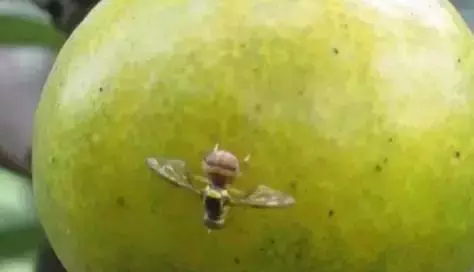
Agricultural control
Artificially check the insect pests and fall fruit, remove the insect pest fruits from the trees and burn them together or put them into the septic tank for soaking; plough the soil near the orchard once in winter and spring, and spray the ground with octyl thiophosphorus, chlorpyrifos, etc. in time to reduce and kill the old mature larvae, pre-pupae and pupae in the soil, and reduce the base of the insect population in the field.
Planting the same fruit tree or the same variety in the orchard only planted the same kind of fruit tree, cut off the food chain of the insect, nearby planting near the ripe fruit trees such as mango, starfruit, guava and other fruit trees with a certain fragrance, it is best to contact a group of prevention and treatment, the prevention and control measures and spraying time, drug varieties, etc. as far as possible to achieve consistency.
Physical control
Adult insects are used to trap the color, odor and sex tendencies in stages, and the time is selected from June to October, and attention is paid to replacing the supplement during the peak period. The main products are yellow plates, enticing adhesives, traps, full catch trap balls, etc., the following is how to improve the booby trap effect.
(1) When supplementing nutrition is needed in the just feathering stage of citrus small fruit fly, it is mainly trapped by green and orange traps combined with food attractants with ethyl acetate.
(2) Using the strong egg-laying tendency of females of citrus small fruit fly to yellow, the yellow trap can be increased during the egg laying period of female insects and combined with the food attractant with ethyl acetate added to trap more female insects.
(3) When using methyl eugenol to trap male insects, combined with food attractants and the use of green and orange traps, it can play an effective control effect on the citrus small fruit fly population.
Biocontrol
Citrus flies are predatory predators, mainly parasitic wasps. In addition, ants, cryptoptera, and salamanders are also effective natural enemies that prey on citrus small fruit fly pupae. In terms of biological agents, there are coccidioides such as coccidioides and other good effects.
It can also be removed by raising chickens, because the old mature larvae have the property of jumping into the topsoil to pupate from the fallen fruit, and the chicken can eliminate the orange small fruit fly pupae in the topsoil. At the same time, chickens can peck at the orange small fruit fly larvae in the grounded star fruit, which can play a certain auxiliary role in the prevention and control of the insect.
chemical control
Canopy spraying bait: In the peak egg laying period of adult insects from May to November, it is optional to spray thick areas of the canopy with avermectin, polycycline, chlorpyridine, chlorpyridine, cypermethrin, imidacloprid and other brown sugar spraying once every 7 to 10 days. In particular, the spray should be focused about one month before harvesting.
Soil insecticidal treatment: In addition to the spring and winter garden, from May to August, spray the orchard ground with octyl thiophos, spray once every 7 days, spray 2 to 3 times continuously, can kill the old mature larvae and the unearthed feathered adult insects that have entered the soil pupae.
【Statement】For reference only, the actual operation must be based on the local climate, soil and consult local experienced agricultural experts! This article comes from the Internet, is not responsible for its authenticity, if there is infringement please contact to delete.